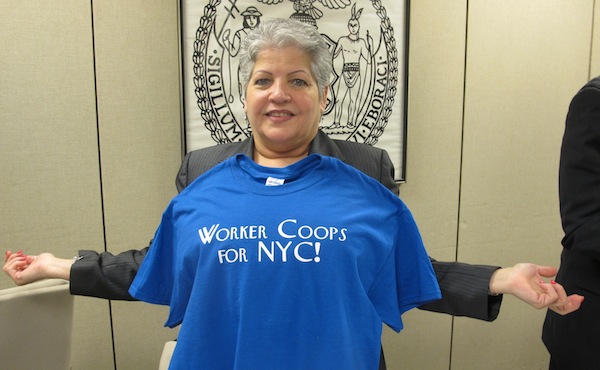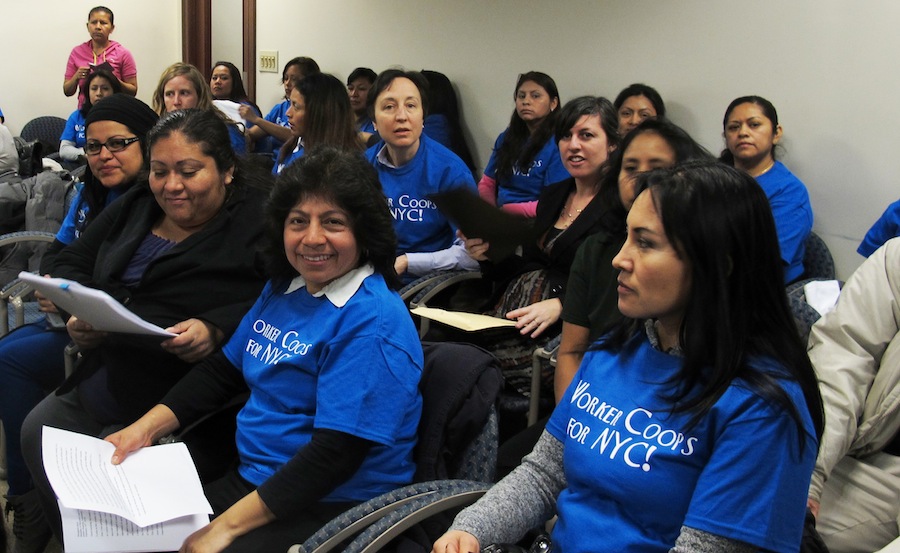Chris Michael is laying down some hard truths. The founding director of the New York City Network of Worker Cooperatives (NYC NOWC), Michael gives a lot of thought to our collective relationship with work and he doesn’t like what he sees. “For the most part, here in the West,” he says, “we’re under the direct, minute to minute, command and control of the investor class.”
He talks about the “abhorrent condition” wherein our bodies and mental capacity are being rented, on an hourly or annual basis, by rich people. But this isn’t a gloom and doom conversation we’re having. Worker cooperatives—or democratic businesses, as Michael calls them—are demonstrating viable alternatives to this rich-boss-poor-worker model. From the huge Mondragon Corporation — a federation of worker cooperatives in Spain — to small, local shops and services, employee-owned businesses offer a way to get out from under the all-controlling command of a boss, and they’re making a lot of interesting noise lately.
In some municipalities, including New York City, local governments are partnering with worker cooperatives to fulfill government contracts. This means that government dollars, rather than going to top-heavy businesses that sacrifice employee well-being and fair compensation in pursuit of larger profit margins, are going to businesses that prioritize long-term employment, fair wages, and democratic workplaces.
In New York City, the department of Small Business Services (SBS) has committed to working with NYC NOWC and is tailoring information, handouts and staff training to include worker cooperatives. Brochures introducing worker cooperatives, with the SBS logo are being distributed at business centers around the city, SBS business courses now include information about worker cooperatives, and a class on starting and running a worker cooperative is being added to existing SBS curriculum.
NYC NOWC is also working with the city’s Economic Development Corporation (EDC) which opens the possibility of doing a comprehensive analysis of worker cooperatives within the city leveraging EDC data sets and staff resources.

The Mondragon federation of worker cooperatives employs over 80,000 people in Spain
Introducing Worker Cooperatives
At a recent public hearing, NYC NOWC made several requests of the city: that it recognize worker cooperatives as valuable tools in job creation, promoting living wages, reducing income inequality, and encouraging democratic workplaces; that EDC, SBS, and city workforce funding should be utilized to support and grow worker cooperatives in the city; and that worker cooperatives should be made a preferred contractor for city agencies.
At the hearing, attendees packed two rooms, with a live feed of the hearing shown in the second room. They brought t-shirts and went double their scheduled time. Things went, according to Michael, remarkably well. When all was said and done, the council members on the committee wanted t-shirts and the chairperson said she’d never been at a public hearing where everyone was on the same side.
What’s happening in New York has been inspired, in large part, by the worker cooperative movement in Cleveland where the Cleveland Evergreen Cooperatives helps marginalized communities create wealth and local jobs by providing sustainable products and services to local institutions and the Ohio Employee Ownership Center (OEOC) works to provide information, technical assistance, outreach and training to business owners, employee groups, community groups and government officials.
These organizations advance the notion that we should strategically develop democratic businesses leveraging the procurement power of large institutions. Michael says that he’d build on that notion and “start at home” with government spending.
“We have some theoretical and actual control over the purchasing that our town, city and state does,” he says. “It makes a whole lot of sense of me that we start with an institution that we have some control over, and government is the largest institution around.”

NYC NOWC is spreading the word about worker cooperatives all around the city. Photo by jseliger2 (CC-BY)
Getting the Ball Rolling
When I ask Michael for advice on engaging government officials in supporting and utilizing worker cooperatives he says that NYC NOWC is still figuring some things out but he offers the following steps to get things rolling.
- Think boldly but proceed cautiously. Don’t be afraid to pronounce big visions and big asks, but do so cautiously and in dialogue with other people.
- Talk to other people. Speak with and partner with other national groups about how you're going to do that local ask. Dialogue over the best ways to proceed and understand that nothing is the first of anything. “Everyone’s very happy to share what their ideas are,” Michael says. For starters, contact NYC NOWC or call the U.S. Federation of Worker Cooperatives.
- Increase public awareness and provide information. Start with schools, colleges, universities, and local business centers. Resources can include informational paperwork, community classes, educational courses and more.
- Think strategically about where development efforts might create the most job growth and might create the most democratic jobs. Look at the numbers, take a look at the procurement reports. What type of spending does your town do, what sorts of data does the city publicly release, what sort of data is it willing to release to a local coalition.
- Spend time with the data. Think very carefully about where, in that maze of contracts and spending that’s being done, the lowest barriers to entry are. Where’s the greatest possibility, short-term, for democratic job creation? Now you have the interest of the city, you have that crucial data, you have professional business people looking at the data, and you’re able to identify some key industries that have low barriers to entry. This is a great opportunity for democratic job creation.
- Do further feasibility steps. Is the city paying for this, or are you paying for it yourselves? Now you’re in a position to go back to the city and say, “We have this list of five or so businesses. We have all these contracts that we want to get to, but we’re going to start with these five.”
- Negotiate. This is when you get into the nitty gritty negotiations, which Michael says can be difficult, where you’re saying, “These are this businesses we’ve identified, we’ve done the feasibility studies, these will work as businesses. Now we need to get something in writing from the city that we can use to get financing for these businesses.”
- Try to get the biggest bang for your buck. You don’t necessarily need to raise a lot of money initially. Try to get the most jobs for the least amount of money.
- Get a go-ahead from the city. Get confirmation that if you open up a democratic business that will cover the city’s needs, the city will contract with you. Here, the city may be able to get you some capital as well in the form of grants and loans.
- Get agreements to use existing worker coops upfront. If, in the course of the analysis, you identify contracts that existing businesses can jump onto, get them onto the contracts. If you’ve identified an industry or contract that doesn’t exist, then build a worker cooperative to meet the need.
- Hire key personnel. Once the city is on-board, you’re ready to hire key personnel and get the business operational to the point where you can do the actual hiring.

Even the council members got in on the coop love at a recent public hearing. Photo: NYC NOWC
Collaboration, Democracy and Funding
Michael points out that the model that worker cooperatives put forth of working collaboratively is nothing new. “We cooperate at a scale unheard of in history,” he says. “It speaks to the power of humanity to achieve great things in unison.”
But he adds that while we collaborate on a global scale every day, most of it us under the rule of an employer rather than a democratic business. Worker cooperatives spring from the heart of democracy: valuing every voice.
“Democracy means,” says Michael, “that we value individual human beings, that we value individual and collective freedom, that we value the dignity of worth of each individual, and we agree that for any group of people that are being governed, the way decisions should be made, at the ultimate level, are democratic.”
The biggest challenge NYC NOWC faces, at this point, says Michael, is securing funding. The organization is competing with other organizations and programs for limited funds.
“There are lots of great organizations to fund in the city,” says Michael. “The mayor wants to fund food, education, hunger and afterschool care. Who can argue with that?”
He says that right now, the NYC NOWC team is sticking their neck out there and trying to ask for something that council members and the mayor will be interested in funding, and are capable of funding given all the other demands that are being placed on them. Looking forward, the organization will continue working to get the city behind democratic businesses, one step at a time.
“We start where we can,” Michael says. “We fulfill the government contracts that we can fulfill and we progressively demand more until we reach the point, I hope in my lifetime, where we can demand all government procurement be done with worker cooperatives.”
He acknowledges that this may indeed be many years in the future, but hopes that at some point, the idea of sacrificing individual and collective freedom for an employer will be a thing of the past.
“One could imagine a society,” he says, “where it’s unlawful to rent a human being.”
##
Top photo: NYC NOWC. Follow @CatJohnson on Twitter









